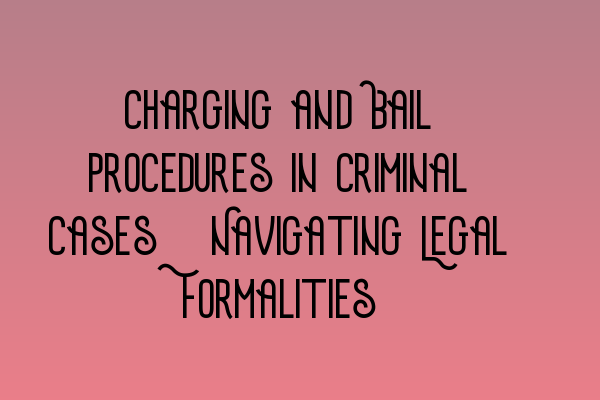Charging and Bail Procedures in Criminal Cases: Navigating Legal Formalities
When facing criminal charges, it is crucial to understand the intricacies of the charging and bail procedures. Navigating through these legal formalities requires the assistance of a skilled criminal law solicitor who is well-versed in the process.
Understanding Charging Procedures
The charging process entails formally accusing an individual of a criminal offense. This is typically initiated by the police, who gather evidence and present it to the Crown Prosecution Service (CPS) for assessment. If the CPS determines that there is sufficient evidence, they will authorize the police to bring charges against the accused.
It is important to note that the charging decision rests solely with the CPS, and they must determine whether there is a realistic likelihood of conviction based on the evidence provided. Once a charge is authorized, the accused will be summoned to appear before a court to face the charges.
The Role of Bail
Bail refers to the temporary release of an accused individual pending their trial. It is a crucial aspect of the criminal justice system as it ensures that the accused’s right to liberty is respected, while also safeguarding the interests of justice. The decision to grant or deny bail is made by the court, taking into account various factors such as the severity of the offense, the likelihood of the accused absconding, and the potential danger posed to the public.
If bail is granted, the accused may be required to provide financial security or adhere to specific conditions imposed by the court. These conditions may include reporting to a police station regularly, surrendering passports, or residing at a specified address. Failure to comply with these conditions may result in the revocation of bail.
The Importance of Legal Representation
Given the complexities of charging and bail procedures, it is essential to engage the services of an experienced criminal law solicitor. A solicitor will guide you through the intricate legal processes, ensuring that your rights are protected and that you have a comprehensive understanding of your options.
At SQE Criminal Law & Practice Law UK, our team of dedicated solicitors specializes in criminal law matters. We have extensive experience in representing clients in a wide range of criminal cases, from minor offenses to serious crimes. We understand the nuances of the charging and bail procedures and will provide you with the expert guidance you need.
If you are preparing for your SQE 1 or SQE 2 exams, we recommend checking out our related articles:
- SQE 1 Practice Exam Questions
- SQE 1 Practice Mocks FLK1 FLK2
- SQE 2 Preparation Courses
- SQE 1 Preparation Courses
- SRA SQE Exam Dates
These articles will provide you with valuable study resources and help you prepare effectively for your exams.
In conclusion, navigating the charging and bail procedures in criminal cases can be challenging without the guidance of an experienced solicitor. It is crucial to seek legal representation to ensure that your rights are protected and that you have a thorough understanding of the process. If you have any questions or require assistance with your criminal case, contact SQE Criminal Law & Practice Law UK today.
